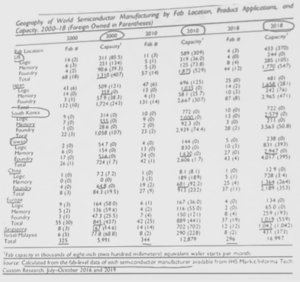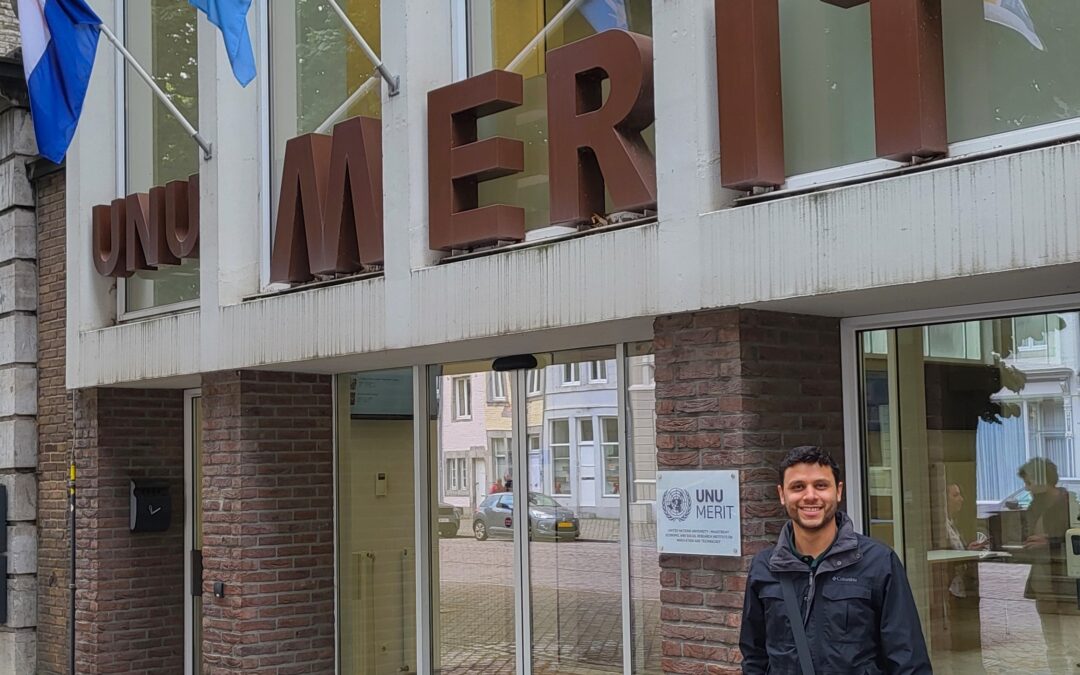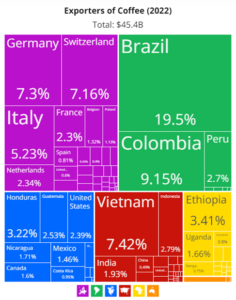How does a country’s ability to produce and export cutting-edge technologies affect its growth potential? What are some of the most promising industries for countries looking to secure long-term growth? In our latest blog post, PhD researcher Isaac López-Moreno Flores reports on the meaning of ‘economic complexity’ and its increasing prevalence as a concept within economic literature.
For some readers, the concept of “Economic Complexity” might initially seem like an advanced and challenging topic in the field of economics. The goal of this blog entry is that the reader can understand the concept of economic complexity easily. I will explain what economic complexity entails, how it is measured, and why it is a relevant research area. Furthermore, I will present examples of topics related to economic complexity not yet widely considered in the literature but would be interesting to explore in the future.
What is economic complexity?
Economic complexity, an emerging field in the economics literature, posits that a country’s growth potential depends on its ability to produce and export products with cutting-edge technology. The main argument is that countries manufacturing high-complexity goods, such as aerospace components or advanced medical devices, will experience faster and sustained growth rates. Conversely, nations exporting low-complexity goods, such as wood, avocados or textiles, will struggle not only to achieve higher growth rates but also to improve their population’s living standards.
The concept of economic complexity is often illustrated using the analogy of a Scrabble game. Countries with more letters (capabilities) can form more complex words (products), leading to greater economic prosperity. On the other hand, countries lacking certain letters (capabilities) will be unable to produce certain words (products), thereby limiting their growth potential. Consequently, researchers try to identify the knowledge and capabilities embedded within a country’s economy by analysing their exports. Using these data, they generate a ranking of countries based on their ability to produce complex products, which also allows them to anticipate each country’s growth potential.
How is Economic Complexity Measured?
The study of economic complexity aims to measure the diversity and sophistication of a country’s productive capabilities. It is based on the premise that countries differ in their ability to produce a wide range of goods, particularly those requiring advanced knowledge and skills. Hence, researchers measure economic complexity by analysing export data, focusing on two key components:
- Diversity: This refers to the range of products a country can produce. A more diverse economy, capable of producing a wider variety of goods, indicates a broader base of knowledge and skills.
- Ubiquity: This refers to the number of countries that can produce a particular good. Products that are less ubiquitous, and produced by fewer countries, tend to be more complex as they require specialised knowledge and capabilities.
Using these data, researchers developed two measures of economic complexity. The Product Complexity Index (PCI) evaluates the complexity of individual products based on the capabilities required to produce them. On the other hand, the Economic Complexity Index (ECI) ranks countries according to their ability to create complex products. The ECI considers both the diversity of products a country can produce and the global ubiquity of these products. Hence, a high ECI score reflects a country’s ability to produce a wide variety of complex goods that few other nations can produce, demonstrating advanced productive capabilities.
Having explained the concept of economic complexity and how its measured, I will now present specific examples that are currently overlooked in studies on economic complexity. I will begin with an example of a low economic complexity product and then provide an example of a high economic complexity product.
Coffee
Coffee is considered a low-complexity product in the Product Complexity Index (PCI). In global coffee exports, Colombia ranks second, although its exports are primarily raw, unrefined beans with no added value. In contrast, Switzerland, a country that does not grow coffee, is also among the top five coffee exporters globally. This is because companies like Nespresso, based in Switzerland, import raw coffee beans, process them into higher-value products such as coffee capsules, and then export these refined products. This value-added process significantly increases the complexity of the product and contributes to Switzerland’s prominent position in the coffee industry despite not being a coffee producer.
Consequently, Switzerland’s coffee exports are more complex than those of Colombia. While the Latin American country plays a crucial role as a primary producer, the European country adds value to the product and gets higher earning within the same industry. Although this difference is evident in export values, it has not been fully addressed in economic complexity studies. Furthermore, this example underscores the importance of enhancing the economic complexity of Colombian coffee exports by investing in refining processes and adding value before exporting. By doing so, Colombia can improve salaries and overall earnings in its coffee industry.
Microchips
 Microchips are among the most economically complex products in the world, with demand continuously increasing due to their critical role in modern technology. These tiny devices, essential for smartphones and many other gadgets, function as small computers capable of processing vast amounts of binary code, the fundamental language of modern technology. Binary code underpins computers, the internet, and countless other technologies, while microchips are designed to process the endless combinations of binary code.
Microchips are among the most economically complex products in the world, with demand continuously increasing due to their critical role in modern technology. These tiny devices, essential for smartphones and many other gadgets, function as small computers capable of processing vast amounts of binary code, the fundamental language of modern technology. Binary code underpins computers, the internet, and countless other technologies, while microchips are designed to process the endless combinations of binary code.
During a lecture by Professor Henry Yeung at the University of Manchester, he explained that microchips vary in complexity, ranging from simpler ones used in household appliances like washing machines and microwaves to highly complex chips used in smartphones and tablets. He noted that China leads in the production of low-complexity microchips, while Taiwan and South Korea produce the most advanced microchips globally. This is an aspect that the literature on economic complexity has not fully considered. Similar to microchips, thousands of products share the same export code but vary significantly in terms of complexity.
Professor Yeung also pointed out that at the beginning of the 21st century, Europe had a higher capacity to produce microchips than China, Singapore, and Taiwan. However, by 2018, these countries had surpassed Europe in microchip production capacity, illustrating that countries can also lose their capabilities and competitiveness to produce complex products in a short period of time. On the other hand, Mexico had opportunities to develop its microchip industry, since the United States was looking for countries to diversify the production of microchips away from China. However, Mexico has not capitalised this opportunity as the country did not have the capabilities to suddenly start producing these complex products. This also demonstrates that the ability to create complex products does not typically develop overnight; it requires skilled individuals, know-how, and various other capacities such as technological, infrastructural, or even geographical resources.
Conclusion
Economic complexity provides valuable insights into a country’s growth potential by evaluating its capacity to produce and export sophisticated goods. The comparison between Colombia and Switzerland and their role in the coffee industry highlights that adding value to a product is another dimension of the economic complexity that is currently overlooked in the literature. Similarly, the microchip industry demonstrates how strategic investments and robust education systems have propelled Asian countries ahead of Europe, while Mexico’s missed the opportunity in this sector due to the lack of know-how and low investment in education. All these examples illustrate that fostering the ability to produce complex products is essential for long-term economic growth as well as to improve – or maintain – living standards of a country’s population.
Acknowledgements
This year, I had the opportunity to attend the Summer School in Economic Complexity at UNU-MERIT, the United Nations University in Maastricht, Netherlands. I would like to express my gratitude to the University of Manchester, the School of Education, Environment and Development, and the Young Scholar Initiative for the funding provided to attend this summer school. This blog entry is a way to report on the knowledge I gained from this summer school, made possible by the support of these institutions.
I must mention that there are other aspects within the literature on this topic that I believe warrant further exploration but were not addressed in this blog. For example, research in this area has primarily focused on product exports. However, it would also be interesting to explore the complexity of services provided within countries. This is closely related to my doctoral research, where I emphasize the importance of distinguishing between informal services, such as street food vending, and formal services, like financial services. In economics, the service sector is often analysed as a homogeneous economic sector, when it is the one with the greatest variation in economic complexity among its different economic activities. Hence, exploring the economic complexity of services is one of the key takeaways I got from attending the summer school and something that I will analyse in the future.
Note: This article gives the views of the author/academic featured and does not represent the views of the Global Development Institute as a whole.
Please feel free to use this post under the following Creative Commons license: Attribution-NonCommercial-NoDerivatives 4.0 International (CC BY-NC-ND 4.0). Full information is available here.


